Edition 80: May 2024
-
Helpful contacts
Employee Assistance Program: 1800 099 444
Nurse & Midwife Support: 1800 667 877
Nurse & Midwife Health Program: 03 9415 7551 or 1800 888 236
-
Upcoming dates
May 2024
2 Advancing Frontline Leadership program (Group 1, Session 3)
5 International Day of the Midwife
5 World Hand Hygiene Day
7 World Asthma Day
8 World Ovarian Cancer Day
9 International Nurses and Midwives Week celebration event (2pm)
12 International Nurses Day
21 Advancing Frontline Leadership program (Group 1, Session 4)
19 Palliative Care Week commences
20 National Volunteer Week commences
20 Kidney Health Week commences
25 Spinal Health week commences
27 PeopleHub go-live
27 Declutter week
26 National Sorry Day
30 World MS Day
31 Nursing and midwifery registration due (to avoid late fee)Check out Events for more details.
-
Nursing & Midwifery Executive
Adjunct Professor Shane Crowe
Executive Director of Nursing & Midwifery
Phone: 8345 1463
Email: shane.crowe@wh.org.auDoug Mill
Director of Nursing & Midwifery
Division: Western@Home
Phone: 0400 807 938
Email: douglas.mill@wh.orh.auAdjunct Associate Professor Jo Mapes
Deputy Executive Director of Nursing & Midwifery
Division: Education & Learning
Phone: 0423 302 337
Email: joanne.mapes@wh.org.auKylee Ross
Director of Nursing & Midwifery Informatics (CNMIO)
Division: Digital Health
Phone: 0409 555 384
Email: kylee.ross@wh.org.auProfessor Linda Sweet
Chair of Midwifery, Deakin University/Western Health
Phone: 8395 1178
Email: linda.sweet@wh.org.auLisa Gatzonis
Director of Nursing & Midwifery Workforce
Phone: 0466 943 769
Email: lisa.gatzonis@wh.org.auMichelle Read
Director of Nursing & Midwifery
Division: Surgery, Endoscopy & Anaesthesia Services
Phone: 0478 260 237
Email: michelle.read@wh.org.auMonique Sammut
Director of Nursing & Midwifery, Sunbury
Divisions: Aged, General Medicine & Subacute Services and WPHU
Phone: 0412 769 423
Email: monique.sammut@wh.org.auNicole Davies
Director of Nursing & Midwifery, Williamstown
Divisions: Emergency Medicine & Intensive Care Services and Access & Patient Flow
Phone: 0435 656 190
Email: nicole.davies@wh.org.auRobyn Peel
Director of Education & Learning
Phone: 0468 608 141
Email: robyn.peel@wh.org.auProfessor Rochelle Wynne
Chair of Nursing, Deakin University/Western Health
Phone: 8395 8163
Email: rochelle.wynne@wh.org.auRohan Vaughan
Director of Nursing & Midwifery, Melton
Divisions: Clinical Support & Specialist Clinics and Drug Health Services
Phone: 0434 365 769
Email: rohan.vaughan@wh.org.auAdjunct Associate Professor Ryan Dube
Director of Nursing
Division: Mental Health & Wellbeing
Phone: 0420 228 035
Email: ryan.dube@wh.org.auAdjunct Professor Tanya Farrell
Deputy Executive Director of Nursing & Midwifery/Director of Maternity Services
Division: Women’s & Children’s
Phone: 0468 830 755
Email: tanya.farrell@wh.org.auVal Dibella
Director of Nursing & Midwifery
Division: Cancer Services, Cardiology & Specialist Medicine
Phone: 0466 489 687
Email: val.dibella@wh.org.auWendy Giddings
Director of Nursing & Midwifery, Bacchus Marsh
Divisions: Western@Home and Integrated Community Health Services
Phone: 0458 603 897
Email: wendy.giddings@wh.org.auAdjunct Associate Professor Wendy Watson
Deputy Executive Director of Nursing & Midwifery
Division: Best Care Governance & Support
Phone: 0478 305 046
Email: wendy.watson@wh.org.au
From Shane
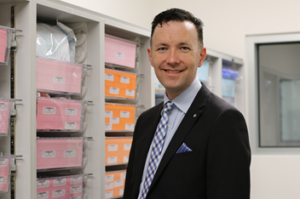
In May each year we are able to reflect and celebrate our professions on the International Day of the Midwife on May 5 and International Nurses Day on 12 May. These important days recognise the impact that the professions have on the community. We will be holding an event to honour both professions on 9 May at 2:00pm, which will include Victoria’s Chief Nursing & Midwifery Officer Karrie Long giving the keynote address and well as the hottest fashion event in town with the launch of our new scrubs! There will also be some surprises throughout the week.
I continue to be humbled and so proud of our nurses and midwives who continue to provide Best Care to our community. Every day you share your skills, knowledge and expertise with care and kindness to those in our community that need it most. All of you make a very real and tangible difference to those in your care and their families. Our nurses and midwives also lead from the front to continuously improve healthcare, nurture our workplace culture, implement innovation and support excellent outcomes for our patients, women and consumers. Individually you are wonderful, and collectively you are phenomenal! Please take some time this month to celebrate being part of our amazing professions.
This month 127 graduate nurses, 25 graduate midwives and early career Enrolled Nurses will be joining us at Western Health. I know that you will join me in making them all feel welcome and part of the team. Our workforce position is currently the best it has been in a number of years. We have no vacancies in our general nursing areas, and very few vacancies in our specialist areas. We very rarely use agency staff (only 0.02% of the time). Our attrition rate is the lowest it has been in a number of years – which means that our nurses and midwives are staying with us longer. We are also actively recruiting from overseas for a number of hard-to-fill specialist areas including midwifery and Mental Health & Wellbeing. Unfortunately, many other organisations are in a very different position. None of this happens by accident, and our Nursing & Midwifery Workforce Plan has been instrumental in driving this success, as well as all of us working together to make Western Health a friendly, supportive and great place to work.
Congratulations to Lauren Scardino, Teysha Sandford-Hill, Victoria Green, Lauren Matthews, Fiona Groen and Patrick Yu Borres who have all been awarded Joy Turner Memorial Scholarships to attend a conference of their choice. These nurses are all actively involved in the continuous improvement activities within their local areas, and continuously show a commitment to Best Care.
In healthcare we are trusted with people’s most sensitive and private information. It is sometimes easy for us to normalise the incredibly privileged place that we have as healthcare professionals, and the trust that the community places in us. Health information is rightfully tightly protected through the law, our policies and procedures and professional obligations. Breaches of privacy can be incredibly damaging to patients, to staff, and ultimately to the public’s trust in the entire healthcare system. The EMR has made accessing this information incredibly easy, which is one of the benefits of the system when used appropriately – however, information must only be accessed if you are responsible for the care of that person. To protect the privacy of our patients, access to medical records at Western Health is electronically logged and routine access audits are undertaken. Unfortunately, curiosity and improper access has occasionally led to nurses and midwives getting themselves into trouble – I implore you to only access the records of your own patients. Just because you can access the information, doesn’t mean that you should!
Getting Rid of Stupid Stuff (GROSS) is launching this month, which is a quick and simple way for you to flag any inefficiencies in your day-to-day work. After completing a brief and easy form, a working group will triage for action or further investigation, depending on complexity. It’s like a sophisticated version of a suggestion box, which will allow us to work on your ideas to get rid of your pain points by enacting change where possible and appropriate, and keep you looped in on progress. Keep an eye out for the launch and new site on the intranet.
Finally, the enterprise agreement for our general nurses and midwives expired on 30 April 2024. The protected action ballot has concluded and protected industrial action was supported by the majority of ANMF members at Western Health that voted in that ballot. I respect the right for our nurses and midwives to take industrial action – it is an integral part of living in a democratic society. Industrial action can be challenging and emotive for all those involved, and it is important to acknowledge that there will be varying views and it will be normal to sometimes feel conflicted. It will however not last forever and there will be an outcome at some point. It is vital that we continue to treat each other with mutual respect and that we don’t do anything that would compromise the important working relationships that each of us has with our colleagues.
Shane Crowe
Executive Director, Nursing & Midwifery
This month we are focusing on...
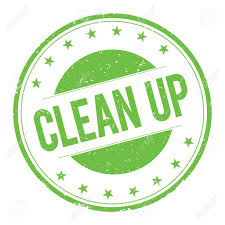 Annual clean up and de-clutter month
Annual clean up and de-clutter month
This month focuses on keeping our environment clean, well maintained, free of clutter and is an opportunity to get rid of that old thing that has been sitting there unused for a while!
De-Clutter Drive
Following a successful introduction of the initiative in October 2023, Health Support Services will conduct another organisation wide de-clutter program, with collection to occur the week commencing Monday 27th May. Further information will be circulated in the coming weeks, noting that there will be some changes from the previous collection.
What is the process for items that are broken or damaged and unable to be repaired?
- A removalist team will collect the items on designated dates in the week commencing Monday 27th May. Specific dates for each WH campus will be communicated closer to collection day.
- De-Clutter Program checklists will be distributed for use to record all items requiring collection.
What is the process for Biomedical equipment that requires fixing or maintenance?
- For Biomedical equipment that is faulty / damaged, please log a BEIMS request to have the equipment repaired.
- For BME and CEL equipment that is no longer required or needs to be disposed of, please log a BEIMS requesting condemnation of the equipment for disposal.
What is the process for unwanted but still serviceable furniture?
- Please check with your colleagues to see if they can make use of your unwanted items in their own work areas. Logistics will be happy to support the relocation of such items at a later time but has limited on-site storage availability.
What is the process for unwanted Digital Technology assets?
- Digital Technology items, such as computers, printers and phones, will not be collected as part of the de-clutter program. Please log a Service Desk request and DTS will assist with your query.
Celebrating our nurses and midwives
With the International Day of the Midwife occurring on May 5 and International Nurses Day occurring on 12 May, we will be holding an event to celebrate our nurses and midwives on 9 May at 2:00pm, which will include Victoria’s Chief Nursing & Midwifery Officer Adjunct Professor Karrie Long giving the keynote address. It will be held in-person at the Sunshine Hospital Auditorium and Live Streamed to all of our sites.
Karrie joined Safer Care Victoria as the state’s Chief Nurse and Midwifery Officer (CNMO) in 2023 and is a visionary nursing leader with over 15 years’ experience driving health delivery innovation to ensure safer and more effective patient care. In her role as CNMO, Karrie provides professional leadership, advice, and direction to the Victoria’s healthcare sector drawing on a unique set of skills acquired across all aspects and levels of nursing, including regional and metropolitan health settings and academia. Karrie has an expansive knowledge of Victoria’s public health system gained through her previous roles as a clinician in intensive care and in education, digital health, research, and senior leadership.
Karrie’s keynote address will be on ‘Nursing and Midwifery in 2024’.
During the event you will be:
- welcomed by our Executive Director of Nursing & Midwifery Adjunct Professor Shane Crowe, who will reflect on the accomplishments of Western Health nurses and midwives, and look towards our exciting future.
- hear from our Director of Nursing for Mental Health & Wellbeing Ryan Dube
- hear from one of our amazing early career midwives.
The event will also see the launch of our new Western Health scrubs for our nurses and midwives – the latest in fashion-forward attire! Everyone who’s anyone will be there at this fashion show!
The event is being held live in the Sunshine Auditorium and will be live streamed across our sites. You are all welcome to join us for an afternoon tea in the Sunshine Atrium after the event.
Internationally recognising nurses and midwives
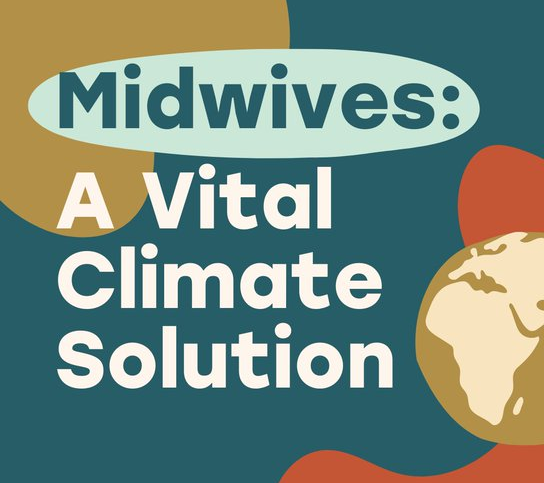
International Day of the Midwife celebrates midwives for all they do each and everyday. The theme for this year is “Sustainable Midwifery : Caring for Tomorrow’s World”. Sustainable midwifery practices prioritise the well-being of both mother and child while minimising environmental impact, ensuring a healthier future for generations to come. The midwifery model of care is environmentally friendly. Evidence shows that continuity of midwife care leads to optimal and safe outcomes by using fewer resources, resulting in less medical waste and a reduced ecological footprint. The care provided as midwives also helps ensure that resources and the time and expertise of obstetricians are more available to women with complex care needs. In the lead up to the new Melton Hospital we will be working collaboratively with our maternity colleagues to improve our model of care to enhance continuity of care to better realise the benefits that it provides by increasing the likelihood of a normal healthy birth and at term, decreasing unnecessary intervention, increase positive experiences of labour and birth and successful breastfeeding.
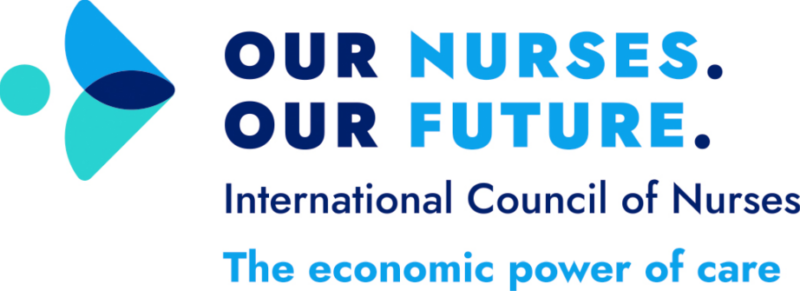
International Nurses Day is celebrated around the world every May 12, the anniversary of Florence Nightingale’s birth. It recognises the impact that nurses have within the community working as the largest healthcare profession across all aspects of a person’s life. The theme for this year is “Our Nurses. Our Future. The economic power of care”. Despite being the backbone of health care, nursing often faces financial constraints and societal undervaluation. This year’s theme aims to reshape perceptions, demonstrating how strategic investment in nursing can bring considerable economic and societal benefits. At Western Health our nursing workforce has grown from approximately 3,500 nurses 5 years ago, to approximately 6,000 in 2024. To meet the healthcare needs of the rapidly growing western metropolitan region, with the new Footscray Hospital, new Melton Hospital and our new community hospitals our nursing workforce is expected to continue grow by between 2,300-4,000 nurses over the next 5 years! Investment in nursing will be vital to ensure that the people of the West have a healthy future.
The Importance of Privacy

Our patients trust us with sensitive health information so we can provide them with the care that they need. That trust is vital for us to be able to do our jobs and that’s why we protect health information so tightly – because even a single breach of privacy can be incredibly damaging to patients, to staff, and ultimately to the public’s trust in the entire healthcare system.
Sometimes people can become curious. Sometimes, as with the Princess of Wales, there can be intense media interest in a particular patient, or sometimes it’s more personal – recognising a face or name. At times like these it is absolutely critical to remember that everyone has a right to privacy of their health information, and to remember that right is enshrined in the law, and further protected by our policies and procedures and professional obligations.
To protect the privacy of our patients, access to medical records at Western Health is electronically logged and our DTS team routinely audits access. Where there is any suggestion of inappropriate access they will also perform an in-depth investigation, and if the access was found to be inappropriate, disciplinary action will follow, including potential dismissal and even possible legal repercussions. It is also important to remember that the same laws and ethical codes cover any information obtained about a patient in the course of providing our health service (e.g. the patient’s address and contact details and also the mere fact that they attended our health service) and also patient information that has come to a person indirectly, for example by overhearing a conversation or glancing at a screen.
We have so many talented staff who have worked hard to build careers in healthcare. It is important that we all remember not to put all that at risk with a single bad decision.
If you need any clarification or a refresher on how and when to access patient information, you can have a conversation with your manager. Resources are also available on WeLearn or via our Privacy Policy (westernhealth.org.au)
Registration Renewal time
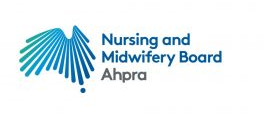
The annual renewal of nurses’ and midwives’ registration lets the public and your colleagues know that you’re still safe to practise.
To avoid a late fee renew online before 31 May 2024. All nurses and midwives needing to have renewed their registration prior to 30 June 2024 to allow them to continue to practise.
Western Health does not employ anyone into any nursing or midwifery position without an active registration for any period.
Payment:
To ensure quick and effective renewal, nurses and midwives and encouraged to renew online.
Renewal fees can be paid by credit/debit card. If you do not have a credit/debit card you can purchase a pre-paid debit card from various retail outlets for a nominal fee.
Non-practicing registration:
Every year Western Health has a large number of nurses and midwives go on some extended leave. Often this is for something like maternity leave or long service leave, where they fully intend to return to work following their leave.
Occasionally some of our nurses or midwives have fallen into the trap of applying for non-practicing registration during their leave, which has impaired their ease of returning to work.
The Nursing and Midwifery Board of Australia (NMBA) regulates the practice of nursing and midwifery in Australia, and one of its key roles is to protect the public. The NMBA does this by developing registration standards, professional codes, guidelines and standards for practice which together establish the requirements for the professional and safe practice of nurses and midwives in Australia.
The types of registration available to nurses and midwives who apply to the NMBA to be registered include general registration, provisional registration, student registration and non-practising registration.
All of our active nurses and midwives are on the general register. Non-practising registration is a type of registration that is suitable for an individual who chooses to stop all nursing and/or midwifery practice but wishes – for personal rather than professional reasons – to retain a
protected nursing and/or midwifery title. Often this is a nurse or midwife who:
- has retired from nursing or midwifery practice
- is experiencing a period of prolonged illness, or
- is intending to take a long period of absence from practice.
Nurses and midwives wishing to take a period of leave (i.e. maternity leave) who are intending to return to work are advised to remain on the general register. Please note however that you must be able to maintain your CPD and recency of practice requirements.
Any nurse or midwife that transitions to non-practising registration needs to go though a process to be able to practise again. That includes lodging an application form (AGNP-40) for general registration and meet all the requirements of the following NMBA registration standards:
- criminal history
- professional indemnity insurance arrangements, and
- recency of practice.
If you the nurses or midwife does not meet the recency of practice registration standard requirement, a re-entry to practice requirement will apply.
Tips and information:
Read the renewal FAQs on the Ahpra website for helpful tips and more information on what you need to do to renew.
If you have difficulty renewing your registration online or you have a query about your registration, please contact Aphra by making a web enquiry or by calling 1300 419 495.
Enterprise Agreement update
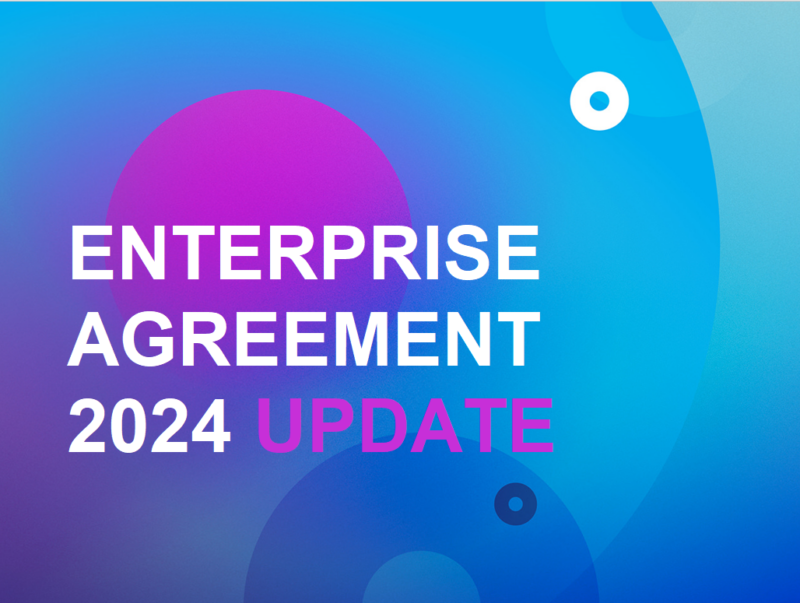
On 19 March the State Government provided an offer to the Australian Nursing & Midwifery Federation in response to their claims and wages proposal for the next Enterprise Bargaining Agreement (EBA).
The offer included a 4-year agreement, a 3% per annum wage increase, a pro rata $1,525 per EFT lump sum payment and agreement to a number of no-cost items to be included in the Agreement. At an ANMF members meeting held on 21 March, a resolution was agreed to reject the offer and hold a protected industrial action ballot.
Protected Industrial Action
The ANMF announced the outcome of the Protected Action ballot to their members at an unpaid meeting on 30 April 2024. The Western Health ballot supported the implementation of protected industrial action measures, including:
- commencing Stage 1 on Tuesday 7 May including wearing campaign t-shirts, refusal to work overtime, promotion of campaign and social media activity, administrative bans, and hospital in the home and community nurses writing messages on work car windows.
ANMF have delayed further industrial actions to allow for the Government to try to resolve the dispute. A further ANMF meeting will be held on Wednesday 15 May to consider any new offer from the Government or to confirm the start of Stage 2 protected industrial action, which includes:
- commencing on Friday 17 May the closure of one in four beds, cancellation of one in four planned surgeries and stop-work meetings.
Protected industrial action should not commence earlier than the above dates.
Western Health values our staff and we respect their right to take industrial action. We recognise that not all of our nurses and midwives are members of the ANMF, and that there will be varying views about the industrial action. It is important that we retain our relationships and are respectful of each other as required by our Code of Conduct.
Please note that whilst posting campaign material, writing on car windows and social media activities are part of the protected industrial action, hospital property must not be damaged by the posting of material and social media activities must comply with the NMBA Social Media Guidance and Western Health’s Social Media – Access, Utilisation and Obligations procedure.
Federal Nurses Award application
A separate and unrelated application has been made by the ANMF Federal Branch to the Fair Work Commission for an increase in the Nurses Award rates of pay for nurses and midwives across the country.
The Application seeks to vary the Nurses Award and has been made following the recent Aged Care Work value case, which saw the wages of nurses and other workers working in the residential aged care sector increase.
The rate of pay in the Nurses Award have traditionally been irrelevant to nurses and midwives working in the Victorian Public Health Sector, as the EBA rates of pay have always been higher. However, if the Fair Work Commission supports this application this may change – as the base pay rate in an EBA can’t be less than the base pay rate in the award.
As this application is not related to the EBA negotiations, both will progress independently with separate timelines.
Keeping informed
Western Health will continue to provide regular updates on the outcomes of the bargaining process and how the new enterprise agreements for 2024-2028 are progressing.
Unions will also provide information to their members through regular publications, notices and meetings.
Any queries or concerns can be discussed confidentially with the relevant Divisional Director of Nursing & Midwifery, Deputy Executive Director of Nursing & Midwifery or People & Culture Business Partner.
Getting Rid of Stupid Stuff set to launch

Western Health’s new business improvement program Getting Rid of Stupid Stuff aims to identify and address inefficiencies in our day-to-day routine, freeing us up to get on with our core work.
Inspired by a Hawaii Pacific Health initiative of the same name, Getting Rid of Stupid Stuff provides a formal mechanism for staff to nominate inefficiencies, which are then triaged for action or further investigation, depending on complexity.
In the first two years of the Hawaii Pacific Health initiative, staff submitted 500 suggestions, leading to changes that removed thousands of hours of administrative time. We hope to achieve something similar through our version of Getting Rid of Stupid Stuff – empowering you to tell us about your pain points, confident in the knowledge that we’ll address your ideas, enact change where possible and appropriate, and keep you looped in on progress. In essence, it’s a sophisticated version of a suggestion box!
How does Getting Rid of Stupid Stuff work?
Getting Rid of Stupid Stuff seeks to address inefficiencies or issues that don’t already have a mechanism for resolution.
Improvement ideas can be simple or complex, administrative or clinical.
- Simple projects: Projects that require minor adjustments to existing processes or practices, require minimal resources and have low risk of failure. Examples:
- Adding specific pieces of equipment to emergency trolleys
- Reducing meeting length in a local area.
The working group will provide a consultative role, providing you with the resources and tools needed to address concerns directly, ensuring smoother operations and better results. While we’re empowering you to take charge of the issues you have identified, it’s important to note that you won’t be shouldering the entire project alone. The GROSS team will be available to assist you with any questions you may have in relation to achieving success in your improvement activity.
- Moderate projects: Projects that involve multiple departments or areas, moderate resources and multiple stakeholders, and substantial changes to existing processes or practices. Examples:
- Streamline or automate triage systems for operating theatre
- Reducing duplication of information for inter-hospital transfers e.g. where information is available on EMR, eliminating duplicate paper forms.
The working group will play a coordinating role, providing analysis, working with relevant teams, co-designing a solution, testing/trialling and implementation.
- Complex projects: Projects involving significant restructuring and use of resources, multiple stakeholders (and/or external partners), high potential for resistance to change and system-wide modifications. Examples:
- Implementation of a new speciality department within the organisation
- Development of a nurse-led specialty clinic.
The working group will play an advocacy role, providing support for strong ideas and presenting them to key decision makers.
Get your ideas ready and keep an eye out for the program launch during May.
Flu and COVID Vax booster time
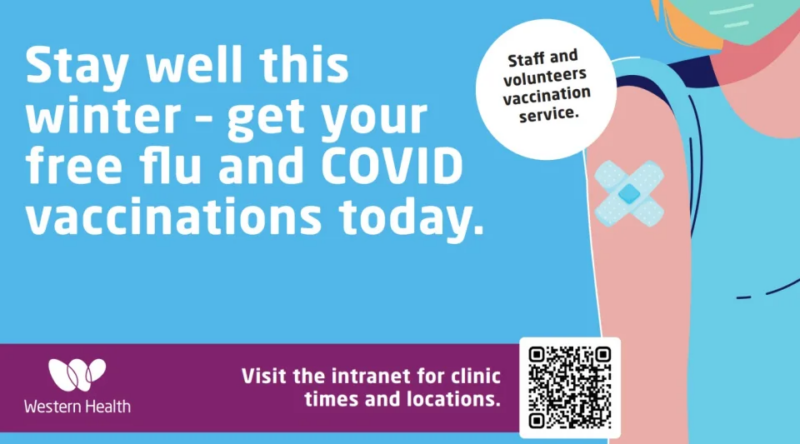
The Western Health staff Influenza Prevention program offers a free vaccine to every member of staff in a bid to keep our Health Service influenza safe.
In 2024, we anticipate ongoing seasonal influenza activity, following the previous year’s resurgence. It is crucial that all healthcare workers get vaccinated against influenza to protect themselves and their patients.
The annual influenza vaccine remains mandatory for all Category A and B healthcare workers – which includes all nurses and midwives. For information on clinic times and locations and for further information please see the Flu Vax campaign website. Roving immunisers will also be out and about, so get double vaxed as soon as you can!
Category A and B healthcare workers are those who have direct physical contact with patients, clients, deceased persons or body parts, blood, body substances, infectious material or surfaces, or equipment that might contain these, or those with prolonged face-to-face contact with patients or clients, or whose normal work is in a clinical area.
In addition to the influenza vaccine, it is also advisable to maintain up-to-date vaccination against COVID-19. Boosters are important to maintain protection against COVID-19, and both the seasonal flu vaccine and the COVID-19 vaccine can be administered simultaneously.
If you’ve been vaccinated at another hospital, by your GP or elsewhere, please complete a quick Redcap survey click on the link access: Influenza Immunisation Survey, attach your immunisation certificate or alternatively, you can consent for us to check your AIR immunisation record.
Staff who have evidence indicating that receiving the influenza vaccine is contraindicated must complete a Redcap survey, click on the link access: Influenza Immunisation Survey, complete and attach the medical certificate from a recognised medical practitioner.
Count down to PeopleHub go-live
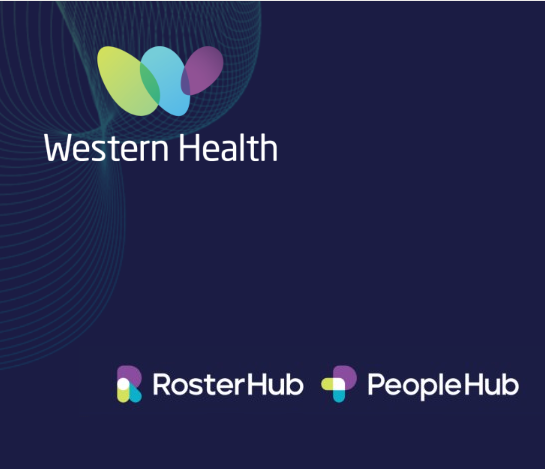
PeopleHub will go-live on Monday 27 May – please be aware of what you need to do to prepare.
When PeopleHub launches, a key change for all staff is that payslips will be available on this new secure platform and will no longer be emailed. You will be able to access PeopleHub via Okta or an application on your phone once we go live. Employees will also be able to view and update their personal details easily on the PeopleHub platform.
We are excited to be introducing a new digital solution for all our recruitment and onboarding needs that is aimed at making the process much simpler for all users. The current eRecruit system will be retired on Monday 17 June, and access will cease on that day.
A detailed training scheduled has been developed. We encourage you to register for training at Get ready for Go Live! via the registration form.
This is significant change to our people management system processes and while there has been extensive consultation and effort in addressing system needs and requirements, we ask for your patience should we need to navigate through any initial issues that may arise after go-live as we are confident in addressing these as effectively and efficiently as possible.
If you have any immediate questions or suggestions, please feel free to reach out to the project team at peopleconnect@wh.org.au.
New Acute Behavioural Disturbance guidance
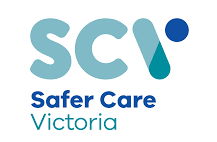
Everyone should expect to feel safe in emergency care settings, but this can be challenging when caring for people experiencing acute behavioural disturbance.
Safer Care Victoria has recently released clinical guidance on caring for people displaying acute behavioural disturbance in emergency settings aims to support clinicians to provide person-centred, evidence-based care for some of our most vulnerable Victorians.
The guidance applies to people aged 16–65 years in emergency departments and urgent care centres and may be adapted for pre-hospital care such as ambulance services, with acknowledgement that some concepts may apply to people outside this range. The clinical guidance aims to support emergency care clinicians to provide person-centred, evidence-based care for everyone, including people with acute behaviours of concern.
It does not apply to people with a clear organic cause for their acute behavioural disturbance such as a closed head injury, dementia or delirium.
World Hand Hygiene Day
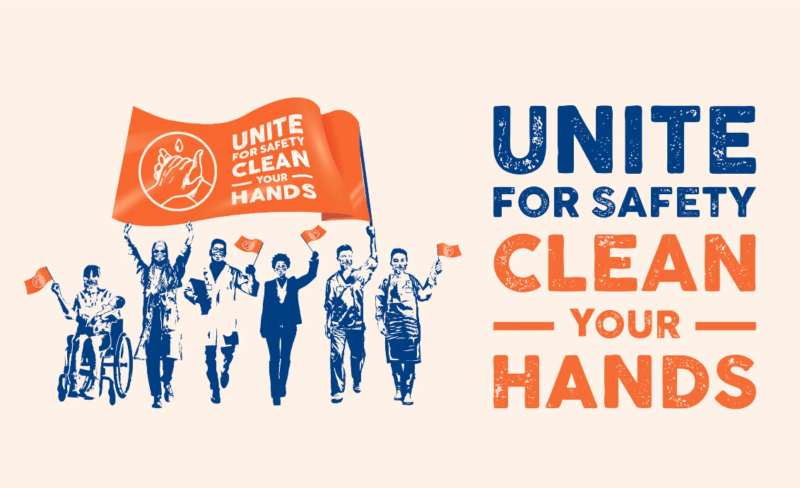
World Hand Hygiene Day, celebrated on May 5th, 2024, is an initiative by the World Health Organisation aimed at promoting hand hygiene across the globe. This day emphasizes the importance of hand hygiene as a simple, effective, and affordable way to prevent the spread of microorganisms and save lives. The campaign focuses on the role of hand hygiene in healthcare settings, encouraging both healthcare providers and patients to practice good hand hygiene techniques. By highlighting the critical nature of clean hands, Western Health fosters a culture of cleanliness that can significantly improve health outcomes for our patients, staff, and visitors.
Hands play an important part in helping us care for ourselves and others.
With winter fast approaching, cold weather and lower humidity levels mean hands often become drier. It’s important to focus on protecting yourself and your patients by maintaining the moisture level of your skin to maintain healthy hands. Intact skin is the first line of defence against infection. Dry, damaged and cracked skin can put you at risk of picking up germs and spreading them to others. It can also lead to discomfort and reduced compliance with hand hygiene.
Factors that affect skin moisture and cause irritation
- Repeated handwashing with soap and water: Handwashing strips oil from the surface of the skin making it less pliable and more likely to crack or tear.
- Using hot water for washing and vigorous drying with paper towel: Hot water removes moisture and the rough surface of the paper towel is abrasive, stripping away the protective outer layer of skin cells when rubbed vigorously.
- Donning gloves while hands are still wet: Donning gloves over damp hands increases the risk of skin irritation. Additionally, sweating while wearing gloves for extended periods also increases likely skin irritation and drying.
Please click on the link to view top tips to keep skin healthy.
Check your skin hydration level
Ecolab will be on site to assess your skin hydration level using a digital skin moisture analyser – All are welcome
| Site | Date | Time | Location |
| Footscray | Friday 3rd May | 1100 – 1230hrs | Opposite volunteer op shop |
| Sunshine | Friday 3rd May | 1300 – 1430hrs | Outside private pharmacy |
| Bacchus Marsh | Monday 6th May | 1330 -1430hrs | Main reception |
| Williamstown | Monday 6th May | 1130 – 1230hrs | Staff café |
National Reconciliation Week
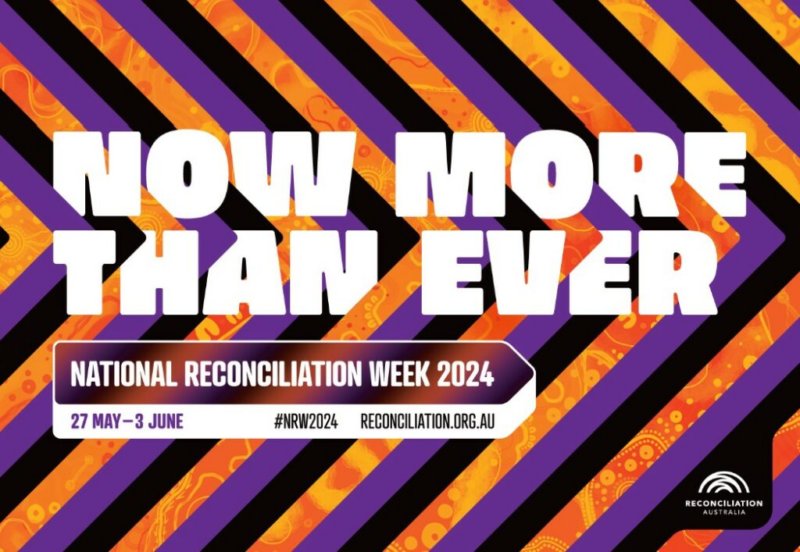
National Reconciliation Week (NRW) is being held between 27 May – 3 June and is a time for all Australians to learn about our shared histories, cultures, and achievements, and to explore how each of us can contribute to achieving reconciliation in Australia.
The theme for 2024 is Now More Than Ever, which is a reminder to all of us that no matter what, the fight for justice and the rights of Aboriginal and Torres Strait Islander people will and must continue.
Here are four things that you can do to help build a better understanding and appreciation of the past and the present and help us on our journey towards a just and equitable future for all Australians.
- Understand Reconciliation
To achieve reconciliation, it’s important that we learn about and celebrate the rich diversity of Aboriginal and Torres Strait Islander cultures and histories, and develop strong relationships built on acknowledgment and respect. Read about how reconciliation will strengthen the relationship with First Nations people and non-Indigenous Australians. - Acknowledge Country
Did you know that an Acknowledgement of Country should be included in all meeting agenda templates and at the start of all education sessions held at Western Health? An Acknowledgement of Country is an opportunity to show respect for Traditional Owners and the continuing connection of Aboriginal and Torres Strait Islander peoples to Country. It can be offered by both Indigenous and non-Indigenous peoples before a meeting, speech or event. You can also include it in your signature block. A Welcome to Country differs from an Acknowledgement as it is delivered by Traditional Owners, or First Nations people who have been given permission from Traditional Owners to welcome visitors to their Country. - Know the Lands on which you stand
Country is the term often used by First Nations people to describe the lands, waterways and seas to which they are connected.
You might like to discover more about the lands you travel to, or where you live and work. The AIATSIS map of Indigenous Australia is a great guide for discovering the traditional owners of the land across Australia. - Cultural Safety is everyone’s job
Aboriginal and Torres Strait Islander cultural safety means that we are creating an environment where there is no challenge or denial of our First Nations patients, staff and volunteers identity or experience. You can improve your cultural awareness by completing Aboriginal Cultural Awareness training on WeLearn. You can also read the Western Health Aboriginal Health Cultural Safety Plan 2022-2025 to learn about what we are doing as a health service to improve the cultural safety and health outcomes of our First Nations consumers, staff and volunteers.
Thank you for your commitment to furthering our understanding of reconciliation as we continue the important journey towards equitable health outcomes for Aboriginal and Torres Strait Islander people.
Hospital in the Home (HITH) Services Expanded: Bringing Acute Care to Your Doorstep
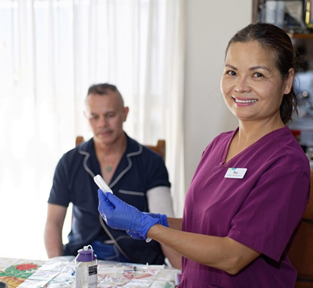
In a bid to enhance patient-centered care and provide acute medical attention within the comfort of patients’ homes, Western Health at Home division has taken a significant stride forward with the expansion of their Hospital in the Home (HITH) service. The service, which offers crucial medical care that would otherwise necessitate an inpatient stay, now has two established units and increased bed capacity.
Patients admitted to the HITH service can receive a spectrum of acute care services in the familiarity and comfort of their own homes. These services range from IV antibiotics and managing anticoagulation to complex dressing changes, heart failure management, post-operative drain tube care, and medical management.
The growth of the HITH services has seen the introduction of a second unit, now operational from Sunshine Hospital. While the longstanding Footscray unit continues services under the experienced leadership of Nurse Unit Manager Paula Lethlean, the recently established Sunshine unit went live on Monday 18th March, 2024. Agnieszka Kuceil, the newly appointed Nurse Unit Manager, leads this unit, which will see bed capacity increase considerably and allow more patients to experience hospital care in their home.
In line with this expansion, Western Health emphasises the importance of identifying suitable patients to be provided care by HITH. Staff are encouraged to consider whether patients in inpatient units or emergency departments could receive ongoing care by the HITH service.
For more information regarding the HITH services or any other enquiries please contact:
Footscray Nurse Unit Manager
Paula Lethlean 0478 407 430
Sunshine Nurse Unit Manager
Agnieszka Kuceil 0481 094 577
For more information including how to refer, visit Hospital In The Home (sharepoint.com)
Implementing Use of Olanzapine Oral Disintegrating Tablets

In line with medication safety and quality use of medicines initiatives, Olanzapine Orally Disintegrating Tablets (ODTs) will be routinely supplied in place of wafers across all sites at Western Health. In certain circumstances, Olanzapine wafer formulations can be provided from pharmacy or night store locations at Sunshine and Footscray hospitals. EMR order sets were updated to include ODT Olanzapine dose forms in mid-April 2024.
Olanzapine ODTs are a cost-effective formulation suitable for many patients, including those with swallowing difficulties. The ODT and wafer presentations are bioequivalent and interchangeable.
ODTs disintegrate quickly when placed on top of the tongue. Once disintegrated, the residue can be swallowed easily and absorbed from the gastrointestinal tract. This mode of medication delivery is the same as the wafer formulation. ODTs are different to conventional sublingual and buccal tablets, which are absorbed directly through the oral mucosa.
ODTs should only be removed from packaging immediately prior to use as they are sensitive to moisture and are not appropriate for placing into Dosage Administration Aids (e.g. webster packs, dosette boxes).
For more information, please contact your ward pharmacist or the pharmacy department.
Peer Support Program
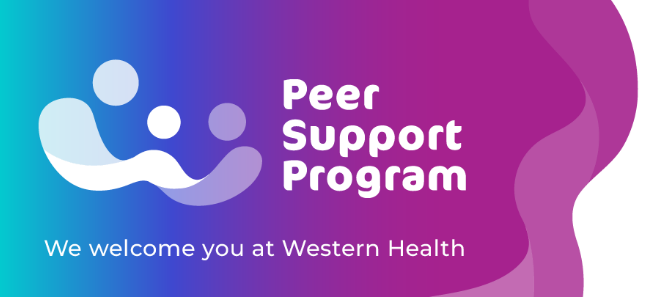
As part of our Positive Workplace Framework, and recognition the need to support each other during challenging times, intake 2 of the Peer Support Program is about to be launched and is looking to recruit nurses and midwives as Peer Supporters for the Western Health Peer Support Program.
The Peer Support Program is an initiative where trained employees volunteer their time to provide support to colleagues, a referral service with an emphasis on brief, practical interventions providing people with support across a range of work and non-work related issues.
The primary objective of the Peer Support Officers is to provide informal and confidential support to all employees and volunteers who may be experiencing difficulties in the workplace or at home. It is generally at short notice and with the aim of providing an empathic response and or assistance for additional and sometimes formal pathways for support. This program complements other Western Health employee support services such as the Employee Assistance Program and the Critical Incident Stress Management (CISM) program.
We’re inviting employees to take part in this program who are seen as credible role models with colleagues and senior staff, have great listening and communication skills, see their fellow employees as their priority, are good at maintaining confidentiality and trust, and make themselves available when people are in need.
It is anticipated successful peer supporters will reach out to follow employees and volunteers who may be involved in any critical event or respond where they can to a call, be available at any time for employees who may self-refer and provide minimal reporting/feedback. Peer Supporters will be provided training and supervision sessions throughout the year.
This program has been running for 6 months now and anonymous post interaction evaluation collected from employees that have used this service has been very positive, with 100% of employees stating they would recommend this service to colleagues, the peer supporters responded appropriately to their needs, and they found the service easy to access and useful.
Some data on the program: In the last quarter of 2023, 10 different Peer Supporters had multiple interactions with staff from Western Health. 10 different departments and 6 different consumers were represented in these interactions, this shows us the service is being used across the Western Health community. 64% of interactions are lasting between 30 minutes and 1 hour with 76% of contact being made either face to face or on-line.
Is this you? If so, please apply for this program via this flyer.
We see this as an important initiative in supporting our employees, ensuring employee psychosocial safety remains a priority and Western Health is well placed to provide the best support to our people who provide best care.
Western Health is a Breastfeeding Friendly Workplace
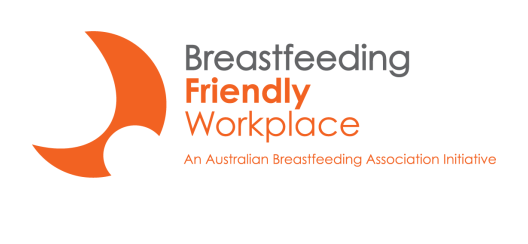
Western Health is proud to receive the prestigious accreditation as a Breastfeeding Friendly Workplace, recognising our commitment to gender equality in the workplace.
The Australian Breastfeeding Association accreditation showcases Sunshine Hospital’s commitment to creating a work environment with the space, time and supportive culture that enables employees to breastfeed.
“Western Health is proud to be a Breastfeeding Friendly Workplace,” Western Health Executive Director, People, Culture and Communications, Adjunct Professor Sandy Schutte said. “It’s recognition of our commitment to being an inclusive workplace that supports staff throughout their life stages. Providing a supportive workplace environment for employees to breastfeed demonstrates a commitment to staff well-being, but it is also a powerful retention and recruitment tool.”
Sunshine Hospital has a Staff Lactation Room where mothers can breastfeed or express milk. It also has family friendly workplace policies in place to support staff and their families.
“As one of the major providers of maternity services in Victoria and an organisation that has a workforce that is 77 per cent female, we know how important it is to remove barriers to breastfeeding,” Western Health Director of Maternity Services and Deputy Executive Director, Nursing and Midwifery, Adjunct Professor Tanya Farrell said.
“Research has shown breastfeeding provides health and nutritional benefits for children with positive lifelong impacts.”
An increasing number of women are returning to work within the first year of their baby’s life.
According to the World Health Organisation (WHO), breastfeeding rates drop significantly when women return to work.
Joan Kirner Women’s and Children’s (JKWC) at Sunshine Hospital is also one of only two maternity services in metropolitan Melbourne to hold the coveted Baby Friendly Health Initiative (BFHI) accreditation. Developed by the WHO and UNICEF in 1990, the BFHI program recognises hospitals who provide world-class support to parents by promoting, encouraging and supporting breastfeeding.
Innovation Acceleration Program 2024

The Innovation Acceleration Program (IAP) enables healthcare professionals from Western Health, including nurses and midwives, to work with teams from the University of Melbourne to develop innovative solutions to unmet needs.
Inspired by past collaborations between Western Health and University of Melbourne the IAP:
- Provides an unique opportunity to Western Health staff – clinical and non-clinical – who have identified unmet needs within the healthcare system and want to develop innovative solutions supported by expert teams.
- Partners Western Health staff with teams of researchers, business developers, and experts in innovation, entrepreneurship, intellectual property, and venture capital investing from the University of Melbourne.
- Provides 12 weeks of customised support and five workshops on value proposition design and talking with stakeholders, business model design and testing, intellectual property, and pathways to funding.
- Supports teams to pitch for funding from $10,000-$100,000 to continue developing their innovations.
In doing so, the IAP aims to:
- Inspire healthcare professionals to become innovators, entrepreneurs, and problem-solvers at scale.
- Equip them with knowledge and experience in established innovation and entrepreneurship best practice.
- Connect them with researchers, business developers, and mentors from the University of Melbourne.
- Encourage an inter-organisational culture of collaborative innovation and opportunity creation.
- Guide them to identify problems worth solving and repeatable, scalable, impactful business models.
- Support them with seed funding to continue their journey of transforming obstacles into opportunities.
- Develop a pipeline for healthcare innovations, intellectual property, and start-ups in Victoria.
Submissions are now open, and close on 15 May 2024. Please contact Bill Karanatsis in the Office of Research with any enquiries.
New ADONM advancing Advanced Practice
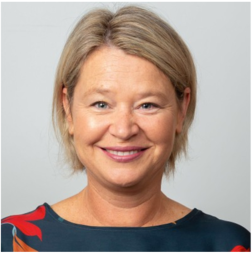
Rebecca Woltsche has recently been appointed as the new Assistant Director of Nursing & Midwifery, Advanced Practice Pathways, as a secondment for the next 12 months.
Rebecca is well known to Western Health and brings vast experience and skills which has been developed over 20 years working as a nurse in clinical, leadership and project roles. Most recently Rebecca has worked as the Assistant Director of Nursing & Midwifery – Improving Care, where she has driven positive change, achieving improved patient care.
Rebecca will be supporting a range of projects and initiatives, to ensure nurses and midwives can access career development opportunities and advanced practice roles are effective.
Rebecca will commence her new role on Monday 6 May 2024. This role will have a focus on scoping and supporting advanced nursing and midwifery practice roles, career pathways, nurse and midwife led care opportunities and supporting the Western Health Nurse Practitioners and Candidates, Advanced practice and specialist nurses and midwives.
New referral process for Hospital in the Home (HITH) Service
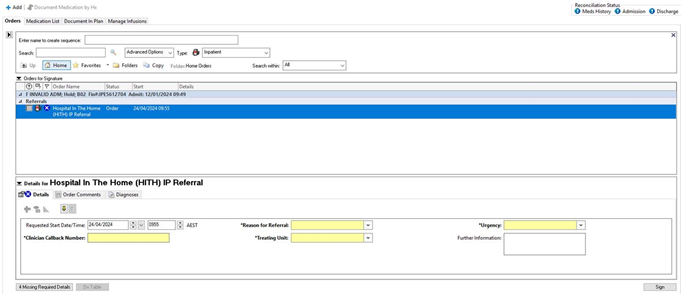
Commencing Wednesday, 15 May 2024, referrals to the Inpatient Hospital in the Home (HITH) service will be available in the EMR.
What is changing?
Currently, referrals to the HITH service are managed through a mix of iPM, fax, and phone/in-person channels. This will now change to an inpatient referral in the EMR.
What are the benefits?
This new process aims to streamline operations for the HITH team, improve accountability and enhance patient safety through comprehensive referral details.
You can stay up to date with other EMR changes by visiting the EMR Updates page on the Digital Health information site.
For further information on the HITH referral process, please contact Paula Lethlean, Nurse Unit Manager at paula.lethlean@wh.org.au.
Gold Partnership with the Australian College of Midwives
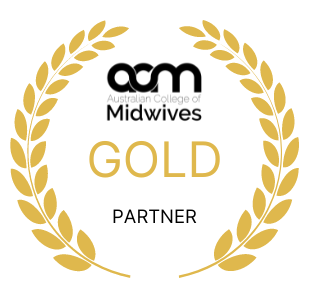
Western Health is now a Gold Partner of the Australian College of Midwives (ACM), which provides our midwives the opportunity to tap into the learning and development opportunities that ACM provides.
The partnership allows our midwives to have access to ACM’s eLearning, recruitment job listings and copies of the Australian Midwifery News magazine.
Western Health will also be supporting some complimentary conference tickets and ACM membership as part of our recognition program for midwives.
To find out more about becoming an ACM member or getting the most out of your membership, please click here.
COVID-19 Aerosol Research Trial
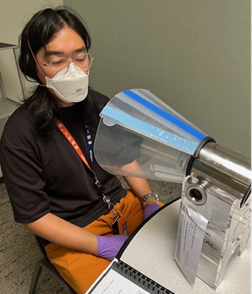
COVID-19 is still circulating in community, and anyone currently infected may be eligible to participate in a simple research study. Particularly given recent socialising across the Easter period, you may know someone who has recently tested positive. This study is suitable for any adult WH staff, family members or friends.
The study is quite simple – we are trying to measure how much SARS-CoV-2 (COVID-19) virus is expelled into the air by an infected person on different days over their illness.
The study is led at Western Health by Dr Forbes McGain, with involvement from Prof Marion Kainer (Infectious Diseases) in collaboration with other infectious diseases physicians, respiratory consultants and scientists at The Royal Melbourne Hospital, The University of Melbourne and the Doherty Institute.
To be eligible for the study, adult volunteer participants must be enrolled and commence the study within 72 hours of the first positive rapid antigen test (RATs) or PCR test.
Participants would be asked to attend Sunshine Hospital Campus to a dedicated testing room. The first visit will take approx. 90 mins, and then we would ask the participant to return for shorter follow-up visits (approx. 45 mins) for up to another 3 visits over the first 1-2 weeks of illness.
We will provide free parking, and participants will be remunerated for their time with gift vouchers up to $300 to show our appreciation for their time and contribution to research.
We hope that this information will help us to learn more about how infective COVID-19 is, particularly over the course of illness, and what factors might influence this in indoor spaces (room temperature, humidity, air flow etc.).
Testing positive to COVID-19 is not fun, but this could be an opportunity to be financially remunerated whilst making an important contribution to medical science.
Volunteers need to text/call the research hotline number on 0421 684 985 for futher information or click here.
Updated Alaris pump dataset
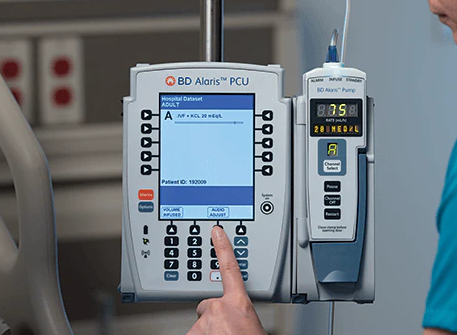
The medication safety drug library for Alaris PC Intravenous Infusion Pumps has been revised to incorporate several medication changes with medical, nursing and pharmacy consultation. The new dataset, Western Health v6.2, will be released via the wireless network for all WH sites (except for Bacchus Marsh and Melton sites) on Wednesday, the 1st of May 2024 (at 7:30am).
An infusion pump must be turned on for the dataset to be downloaded via the wireless network. You will need to allow 2-3 minutes for the new dataset to be downloaded.
Once the dataset has been downloaded (Wi-Fi light will stop flashing), switch the pump off. The new dataset will be activated when the pump is next switched on and the user selects NEW patient. Please ensure that all pumps in storage have the dataset activated via the above method and that the new dataset Western Health V: 6.2 is visible on pumps, before using it for any new patients. Your ward pharmacist can assist if required.
This update of the drug library includes:
- New concentration of 3mg/50mL Noradrenaline added into the ICU/Theatre profile. Note: Intended for FICU use only.
- New datasets for Phosphate Sodium and Argipressin (neonatal profile).
- Changes to align with PPG: Phenytoin, Indometacin, Vecuronium, Dopamine, Dobutamine (neonatal profile) and Isoprenaline (cardiac profile).
- New therapy and concentrations added for Adrenaline (paediatric profile)
For further information, contact the Electronic Medicines Management Senior Pharmacist via phone 0468 565 463 or via email emeds.pharmacist@wh.org.au or Biomedical Engineering Services at your site.
Benchmarking Best Care
The latest benchmark reports from the Health Roundtable that go up to December 2023 have recently been released, that show how our delivery of Best Care compares to other health services across Australasia.
Let’s look at how we perform in the area of falls. The following data looks at the rate of falls that result in an intracranial haemorrhage, fractured neck or femur or other fractures.
Falls:

We have had a drop in the falls with serious injury in the last quarter bringing when compared with our peers.
Over the past 12 months, unfortunately Western Health is performing poorly in this indicator, so continued focus and effort is required in this area.
The continuing efforts of our Falls Champions implementing the actions from the Falls Improvement Plan is essential to keeping this heading in the right direction.
We can do this!
Educational Opportunities
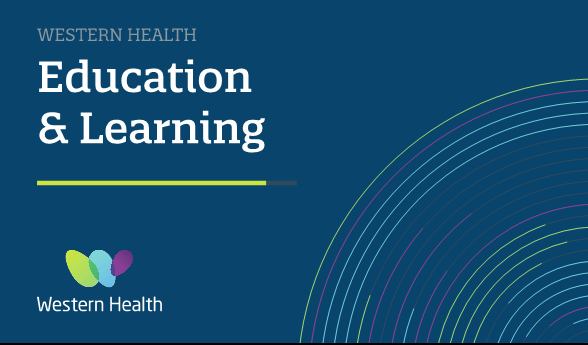
Are you ready to embark on an exciting educational journey in 2024? Please click here for details on how to apply.
Refer to the Department of Health links below to see if you qualify for the 2024 DHS Scholarships:
- Post Graduate Nursing/Midwifery scholarship information
- EN to RN DHS scholarship information
- Mental Health Post Graduate Scholarship information
- Aboriginal Nursing and Midwifery Postgraduate Scholarship Program information.
Upcoming courses being offered to Western Health nurses and midwives:
May 2024
1 – Preceptorship Study Day (Bacchus Marsh)
10 – The 3’D’s – Dementia, Delirium and Depression Study Day
13 – Deteriorating Patient Study Day
15 – Heart failure Study Day
16 – Respiratory Study Day
28 – Aboriginal & Torres Strait Islander Health Study Day
June 2024
3 – Nutrition Study Day
4 – Tracheostomy Study Day
4 – VAC Study Day
12 – Subacute Study Day
12 – Surgical Study Day – Basic
13 – CVAD workshop
14 – Hand Hygiene General Auditor Training
20-21 – Advanced Life Support Level 2 (ALS2)
31 – Continence Study Day
Please visit the Education and Learning link for more courses.
Emerging Evidence
The Western Health Library Service is a great source for locating the latest nursing and midwifery related evidence based practice and research.
Latest articles of interest
- Strategies for the delivery of sex-based equity in cardiovascular clinical trials. Nature Reviews Cardiology. 2024: April. Full Text Western Health Author
- Breastfeeding and pre-pregnancy bariatric surgery: A scoping review. Women & Birth. 2024: May. Full Text Western Health Author
- Sustainability of rural Victorian maternity services: ‘We can work together’. Women & Birth. 2024: May Full Text Western Health Author
- An innovative low-cost breast pump-hire program to enhance breastfeeding rates in a neonatal intensive care unit. Journal of Advanced Nursing. 2024: April. Full Text Western Health Author
- Trends and disparities in perinatal health outcomes among women from refugee backgrounds in Victoria, Australia: A population-based study. Midwifery. 2024: March. Full Text Western Health Author
- The barometer of moral distress in midwifery: A pilot study. Women & Birth. 2024: May. Full Text Western Health Author
eMIMS elite on the Clinicians Health Channel
The Clinicians Health Channel is providing eMIMS elite, replacing MIMS Online. Both will be available until 1 June 2024, when eMIMS elite will then be the only point to access the resource.
Get ready! eMIMS elite is available and accessible now via the Clinicians Health Channel website, and Western Health Library website and intranet homepage.
Why not give it a go and familiarise yourself before MIMS Online will no longer be available.
Access to the eMIMS elite app has changed. Find out how to get the eMIMS app: eMIMS elite app instructions. Also refer to: eMIMS elite user guides.
New library intranet interface
With the launch of the new Western Health intranet, the library’s intranet homepage has also had a revamp.
Explore the library’s intranet homepage to find point of care resources, journals, books, eBooks and more…
- Go to the Western Health intranet homepage
- On the Top navigation, either click on:
Department & Services > “L” > “Library”, or
Education & Learning > On your right quick links “Library information / Quick links / Databases”.
Upcoming workshops
See a list of all our upcoming group workshops or book 1-on-1 training.
New arrivals
View all recently added eBook and print catalogue titles
Accessing the Library at Work
Eligible staff can access electronic Intranet library resources from any networked PC or device connected to Wi-Fi network without the need to login.
Accessing the Library Remotely (off-site access)
When accessing electronic resources through the library website from offsite you will automatically be asked to enter your library membership number and surname. Library Membership is free and can be completed online. Please email the library if you experience issues.
For more information, please contact the Western Health library team.


